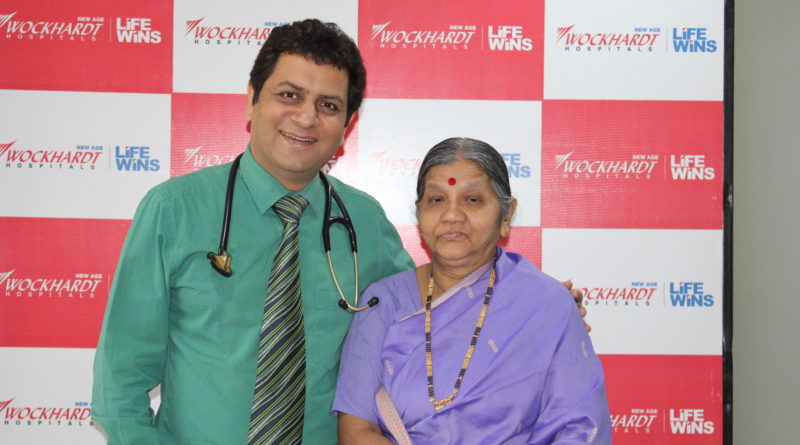Doctor Creates Controlled Heart Attack for a Good: rare of the rarest procedure performed successfully at Wockhardt hospital
Treated 65-year-old Female suffering from rare genetic disorder called “Hypertrophic Obstructive Cardio Myopathy (HOCM)
Mumbai: In an unusual situation where we speak on preventing heart attack, Dr. Ravi Gupta, Cardiac Surgeon Wockhardt Hospital Mumbai Central created a controlled and planned heart attack at operation theatre for a good, known as minimally invasive Alcohol Septal Ablation (ASA) procedure to treat 65-year-old female suffering from genetic disorder called Hypertrophic Obstructive Cardiomyopathy (HOCM).
65-year-old Ms Sunita Pawar was undergoing treatment for breathing problem from past few years under chest physician Dr. Kedar Toraskar at Wockhardt Hospital. She was admitted for complain of difficulty in Breathing and bronchial asthma. During the treatment, Dr Toraskar realized that she also had some other problems that need to be treated first. Hence she was referred to cardiologist Dr Ravi Gupta.
Dr Ravi Gupta, Cardiac Surgeon Wockhardt Hospital, Mumbai Central Said “To evaluate the heart condition, a loud murmur was detected over her chest and patient was suggested to undergo 2D echo for any structural heart disease. Investigation report confirmed that she had a problem of Hypertrophic Obstructive Cardio Myopathy (HOCM) which is rare kind of genetic disorder which results in abnormal thickening of the muscular tissue of the heart.”
Dr Gupta further adds “It was very complex situation as her Heart muscle was very thick to an extent that it was pinching her heart cavity, due to which the blood flow which is supposed to go out from heart is severely compromised as the path was narrow because muscles were very thick. In such situation we had an option of treating by using drugs but this group of drugs( beta blockers) are contraindicated in bronchial asthma patients so it was not possible, 2nd option was open heart surgery was again of very high risk hence it was ruled out. Third option was to deliberately decreasing the blood supply in the muscle so heart muscles start regressing in the thickness.”
“HOCM is a very rare case and found hardly in the 1 million cases per year. HOCM can lead to clinical heart failure, life-threatening arrhythmias, mitral regurgitation and sudden cardiac death. During the treatment, the artery supplying that particular thickened muscle is localized and a small amount of pure alcohol is pushed through the catheter into the artery to destroy the excess tissues that were blocking blood flow. This creates a Mild chest pain or discomfort (heart attack) may be experienced during this procedure. This kind of procedure is called as Alcohol Septal Ablation which is used to treat HOCM. This problem has similar complication of heart attack. In this treatment we located artery, went for selective artery block created. In this procedure we had put temporary pacemaker and the whole procedure was done in local anesthesia. ”
Hypertrophic cardiomyopathy (HCM) is a disease in which the heart muscle becomes abnormally thick. The thickened heart muscle can make it harder for the heart to pump blood. HOCM, the thickened heart muscle can cause shortness of breath, chest pain or problems in the heart’s electrical system, resulting in life-threatening abnormal heart rhythms (arrhythmias). HOCM have approximately 5 % sudden death cases due to heart attack
Alcohol septal ablation is a minimally invasive procedure performed when severe symptoms cannot be controlled with drugs. In obstructive HOCM, the wall (septum) between the heart’s ventricles thickens to the extent of severely restricting the blood flow to the body. Alcohol Septal ablation creates a tiny, managed heart attack in the abnormally thickened heart tissue. The damaged tissue dies and is replaced by thinner scar tissue, restoring blood flow out of the heart.
Ms Sunita Pawar patient says” We are very thankful to doctors & the hospital as they have been helpful and supportive for overall treatment. I am glad with the improvement taking place. “




